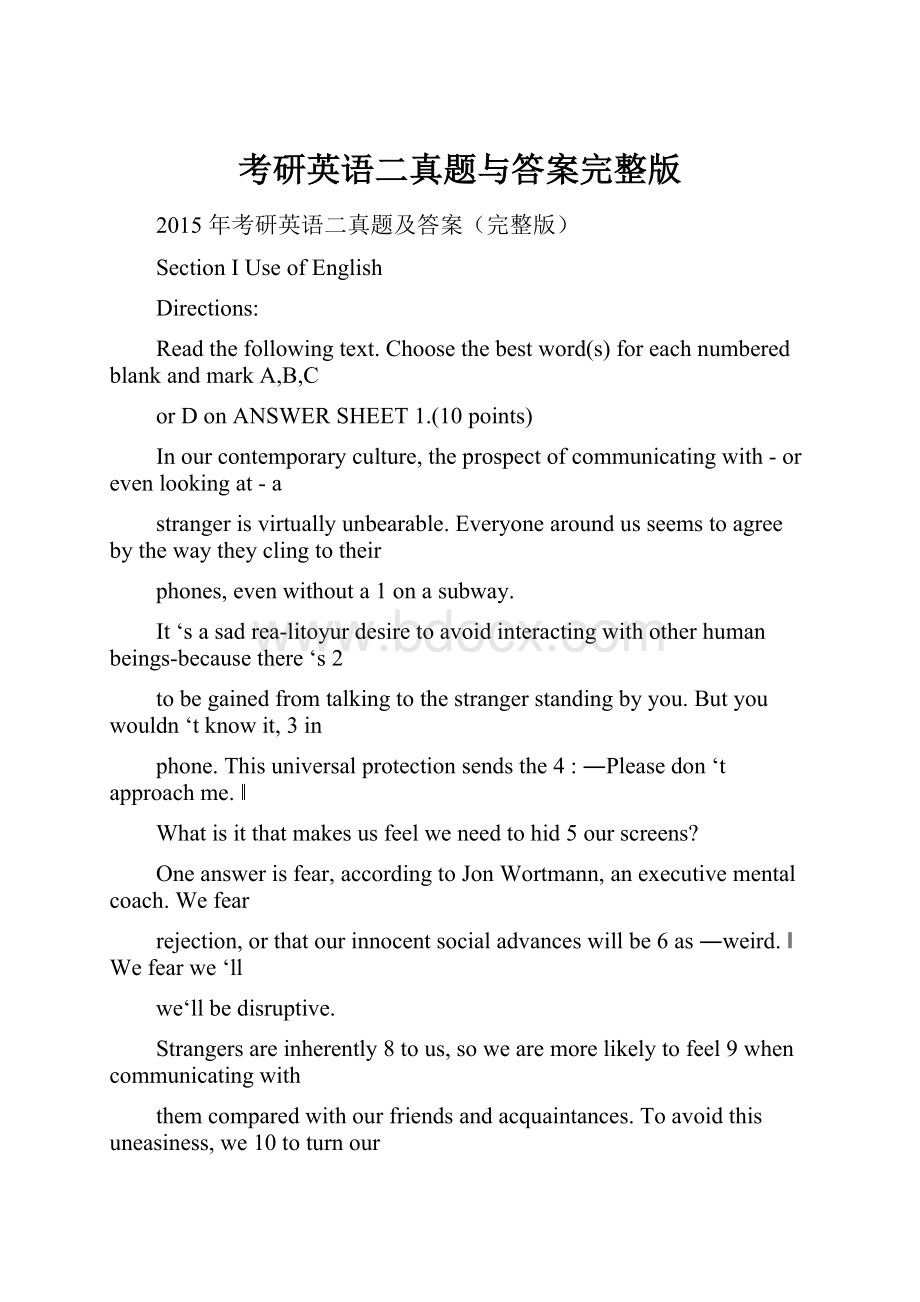 考研英语二真题与答案完整版.docx
考研英语二真题与答案完整版.docx
- 文档编号:27598642
- 上传时间:2023-07-03
- 格式:DOCX
- 页数:22
- 大小:26.77KB
考研英语二真题与答案完整版.docx
《考研英语二真题与答案完整版.docx》由会员分享,可在线阅读,更多相关《考研英语二真题与答案完整版.docx(22页珍藏版)》请在冰豆网上搜索。

考研英语二真题与答案完整版
2015年考研英语二真题及答案(完整版)
SectionIUseofEnglish
Directions:
Readthefollowingtext.Choosethebestword(s)foreachnumberedblankandmarkA,B,C
orDonANSWERSHEET1.(10points)
Inourcontemporaryculture,theprospectofcommunicatingwith-orevenlookingat-a
strangerisvirtuallyunbearable.Everyonearoundusseemstoagreebythewaytheyclingtotheir
phones,evenwithouta1onasubway.
It‘sasadrea-litoyurdesiretoavoidinteractingwithotherhumanbeings-becausethere‘s2
tobegainedfromtalkingtothestrangerstandingbyyou.Butyouwouldn‘tknowit,3in
phone.Thisuniversalprotectionsendsthe4:
―Pleasedon‘tapproachme.‖
Whatisitthatmakesusfeelweneedtohid5ourscreens?
Oneanswerisfear,accordingtoJonWortmann,anexecutivementalcoach.Wefear
rejection,orthatourinnocentsocialadvanceswillbe6as―weird.‖Wefearwe‘ll
we‘llbedisruptive.
Strangersareinherently8tous,sowearemorelikelytofeel9whencommunicatingwith
themcomparedwithourfriendsandacquaintances.Toavoidthisuneasiness,we10toturnour
phones.―Phonesbecomeoursecurityblanket,‖Wortmannsays.―Theyareoutrhappyglasse
protectusfromwhatweperceiveisgoingtobemore11.‖
Butonceweripofftheband-aid,tuckoursmartphonesinourpocketsandlookup,itdoesn
12sobad.Inone2011experiment,behavioralscientistsNicholasEpleyandJuliana
Schroederaskedocmmuterstodotheunthinkable:
―Starta13.TheyhadChicagotraincommuters
talktotheirfellow14.WhenDr.EpleyandMs.Schroederaskedotherpeopleinthesametrain
stationto15howthewouldfeelaftertalkingtoastranger,thecommutersthoughttheir16would
bemorepleasantiftheysatonthierown,‖TheNewYorkTimessummarizes.Thoughthe
participantsdidn‘texpectapositiveexperience,afterthey17withtheexperiment,
personreportedhavingbeenembarrassed.‖
18thesecommuteswerereportedlymoreenjoyablecomparedwiththosewithout
communication,whichmakesabsolutesense,19humanbeingsthriveoffofsocialconnections.
It'sthat20:
Talkingtostrangerscanmakeyoufeelconnected.
1.[A]ticket[B]permit[C]signal[D]record
2.[A]nothing[B]little[C]another[D]much
3.[A]beaten[B]guided[C]plugged[D]brought
4.[A]message[B]code[C]notice[D]sign
5.[A]under[B]beyond[C]behind[D]from
6.[A]misinterpreted[B]misapplied[C]misadjusted[D]mismatched
7.[A]fired[B]judged[C]replaced[D]delayed
8.[A]unreasonable[B]ungrateful[C]unconventional[D]unfamiliar
9.[A]comfortable[B]anxious[C]confident[D]angry
10.[A]attend[B]point[C]take[D]turn
11.[A]dangerous[B]mysterious[C]violent[D]boring
12.[A]hurt[B]resist[C]bend[D]decay
13.[A]lecture[B]conversation[C]debate[D]negotiation
14.[A]trainees[B]employees[C]researchers[D]passengers
15.[A]reveal[B]choose[C]predict[D]design
16.[A]voyage[B]flight[C]walk[D]ride
17.[A]wentthrough[B]didaway[C]caughtup[D]putup
18.[A]Inturn[B]Inparticular[C]Infact[D]Inconsequence
19.[A]unless[B]since[C]if[D]whereas
20.[A]funny[B]simple[C]logical[D]rare
SectionIIReadingComprehension
PartA
Directions:
Readthefollowingfourtexts.AnswerthequestionsbeloweachtextbychoosingA,B,C,orD.
MarkyouranswersonANSWERSHEET1.(40points)
Text1
Anewstudysuggeststhatcontrarytomostsurvey,speopleareactuallymorestressedat
homethanatwork.Researchersmeasuredpeople‘scortisol,weshsicmhaisrkaesr,trwhilethey
wereatwereworkandwhiletheywereathomeandfoundithigheratwhatissupposedtobea
placeofrefuge.
―Furthercontradictingconventionalwisdom,wefoundthatwomenaswellasmenhave
lowerlevelsofstressatworkthanathome.‖Writeoneoftheresearchers,SarahDamaske.Infact
womenevensaytheyfeelbetteratwork,shenotes,―Itismen,notwomen,whoreportbeing
happierathomethanatwork.‖Anothersurpriseisthatthefindingsholdtrueforboththosewith
childrenandwithout,butmoresofornonparents.Thisiswhypeoplewhoworkoutsidethehome
havebetterhealth.
Whatthestudydoesn‘tmeasureiswhetherpeoplearestilldoingworkwhenthey‘
whetheritishouseholdworkorworkbroughthomefromtheoffice.Formanymen,theendofthe
workdayisatimetokickback.Forwomenwhosayhome,theynevergettoleavetheoffice.And
forwomenwhoworkoutsidethehome,theyoftenareplayingcatch—up—with—householdtasks.
Withtheblurringofroles,andthefactthatthehomefrontlagswellbehindtheworkplacein
makingadjustmentsforworkingwomen,it‘snotsurprisingthatwomenaremorestressedat
home.
Butit‘snotjustagenderthing.Atwork,peopleprettymuchknowwhatthey‘res
bedoing:
working,makingmoney,doingthetaskstheyhavetodoinordertodrawanincome.
Thebargainisverypure;Employeeputsinhoursofphysicalormentallaborandemployeedraws
outlife—sustainingmoola.
Onthehomefront,however,peoplehavenosuchclarity.Rareisthehouseholdinwhichthe
divisionoflaborissoclinicallyandmethodicallylaidout.Therearealotoftaskstobedone,there
areinadequaterewardsformostofthem.Yourhomecolleague—syourfamily—havenoclear
rewardsformostofthem.Yourhomecolleague—syourfamily—havenoclearrewardsfortheir
labor;theyneedtobetalkedintoit,orifthey‘reteenagers,threatenedwithcompleterem
allelectronicdevices.Plus,they‘reyourfamily.Youcannotfir.eYyoouunrefavmerilyreallyget
togohomefromhome.
Soit‘snotsurprisingthatpeoplearemorestressedathome.Notonlyarethetasksapparently
infinite,theco—workersaremuchhardertomotivate.
21.AccordingtoParagraph1,mostprevioussurveysfoundthathome.
[A]wasanunrealisticplaceforrelaxation
[B]generatedmorestressthantheworkplace
[C]wasanidealplaceforstressmeasurement
[D]offeredgreaterrelaxationthantheworkplace
22.AccordingtoDamaske,whoarelikelytobethehappiestathome?
[A]Workingmothers
[B]Childlesshusbands
[C]Childlesswives
[D]Workingfathers
23.Theblurringofworkingwomen‘srolesreferstothefactthat.
[A]theyarebothbreadwinnersandhousewives
[B]theirhomeisalsoaplaceforkickingback
[C]thereisoftenmuchhouseworkleftbehind
[D]itisdifficultforthemtoleavetheiroffice
24.Theword―moola‖(T,inePa4ra4)mostprobablymeans.
[A]energy
[B]skills
[C]earnings
[D]nutrition
25.Thehomefrontdiffersfromtheworkplaceinthat.
[A]homeishardlyacozierworkingenvironment
[B]divisionoflaborathomeisseldomclear-cut
[C]householdtasksaregenerallymoremotivating
[D]familylaborisoftenadequatelyrewarded
Text2
Foryears,studieshavefoundthatfirst-generationcollegestuden–tthosewhodonothavea
parentwithacollegedegree–lagotherstudentsonarangeofeducationachievementfactors.
Theirgradesarelowerthanandtheirdropoutratesarehigher.Butsincesuchstudentsaremost
likelytoadvanceeconomicallyiftheysucceedinhighereducation,collegesanduniversitieshave
pushedfordecadestorecruitmoreofthem.Thishascreated―aparadox‖inthatrecruitin
first-generationstudent,butthenwatchingmanyofthemfail,meansthathighereducationhas
―continuedtoreproduceandwiden,ratherthanclose.‖Anachievementgapbasedonsocial
accordingtothedepressingbeginningofapaperforthcominginthejournalPsychological
Science.
Butthearticleisactuallyquiteoptimistic,asitoutlinesapotentialsolutiontothisproblem,
suggestingthatanapproach(whichinvolvesaone-hour,next-to-no-costprogram)canclose63
percentoftheachievementgap(measuredbysuchfactorsasgrades)betweenfirst-generationand
otherstudents.
Theauthorsofthepaperarefromdifferentuniversities,andtheirfindingsarebasedona
studyinvolving147students(whocompletedtheproject)atanunnamedprivateuniversity.First
generationwasdefinedasnothavingparentwithfour-yearcollegedegree.Mostofthe
first-generationstudents(59.1percent)wererecipientsofPellGrants,afederalgrantof
undergraduateswithfinancialneed,whilethiswastrueonlyfor8.6percentofthestudentswithat
leastoneparentwithfour-yeardegree.
Theirthesis–thatarelativelymodestinterventioncouldhaveabigimpact–wasbasedon
theviewthatfirst-generationstudentsmaybemostlackingnotinpotentialbutinpractical
knowledgeabouthowtodealwiththeissuesthatfacemostcollegestudents.Theycitepast
researchbyseveralauthorstoshowthatthisisthegapthatmustbenarrowedtoclosethe
achievementgap.
Manyfirst-generationstudents―struggledtonavigatethe-cmlaisdsdcleultureofhigher
education,learnthe?
rulesofthegame,‘andtakeadvanretasgoeurocfecso,lle‖getheywrite.And
thisbecomesmoreofaproblemwhencollegesdon‘ttalkabouttheclassadvantagesand
disadvantagesofdifferentgroupsofstudents.BecauseUScollegesanduniversitiesseldom
acknowledgehowsocialclasscanaffectstudentseducational‘experiences,manyfirst-generation
studentslackofsightaboutwhytheyarestrugglinganddonotunderstandstudents?
likethem
canimprove.‖
26.Recruitingmorefirst-generationstudentshas.
[A].reducedtheirdropoutrates
[B].narrowedtheachievementgap
[C].misseditsoriginalpurpose
[D].depressedcollegestudents
27.Theauthoroftheresearcharticleareoptimisticbecause.
[A].theproblemissolvable
[B].theirapproachiscostless
[C].therecruitingratehasincreased
[D].theirfindingsappealtostudents
28.Thestudysuggeststhatmostfirst-generationstudents.
[A].studyatprivateuniversities
[B].arefromsingle-parentfamilies
[C].areinneedoffinancialsupport
[D].havefailedthe
- 配套讲稿:
如PPT文件的首页显示word图标,表示该PPT已包含配套word讲稿。双击word图标可打开word文档。
- 特殊限制:
部分文档作品中含有的国旗、国徽等图片,仅作为作品整体效果示例展示,禁止商用。设计者仅对作品中独创性部分享有著作权。
- 关 键 词:
- 考研 英语 二真题 答案 完整版
 冰豆网所有资源均是用户自行上传分享,仅供网友学习交流,未经上传用户书面授权,请勿作他用。
冰豆网所有资源均是用户自行上传分享,仅供网友学习交流,未经上传用户书面授权,请勿作他用。


 #2机组现场施工用电布置措施.docx
#2机组现场施工用电布置措施.docx
